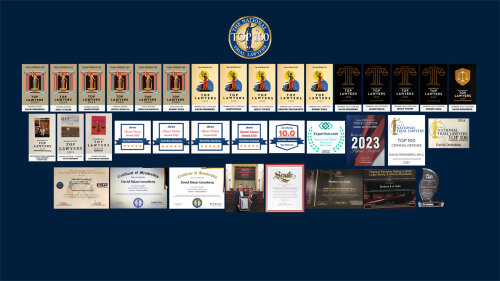Best Housing, Construction & Development Lawyers in California
Share your needs with us, get contacted by law firms.
Free. Takes 2 min.
Free Guide to Hiring a Real Estate Lawyer
Or refine your search by selecting a city:
List of the best lawyers in California, United States
About Housing, Construction & Development Law in California, United States
Housing, construction, and development law in California covers a wide range of regulations and statutes that govern how homes, apartments, commercial buildings, and public infrastructure are built, maintained, and managed. This legal field ensures that construction projects are safe, residents are protected, and local communities develop in accordance with city and state planning goals. It encompasses landlord-tenant laws, construction contracts, building codes, zoning, land use, environmental compliance, and fair housing standards. Given California's ongoing housing crisis and frequent updates to construction standards, legal guidance in this area is especially important.
Why You May Need a Lawyer
There are several common situations where someone may need help from a lawyer who specializes in housing, construction, and development law in California:
- Disputes between landlords and tenants, including eviction, lease issues, or habitability claims.
- Problems with contractors, such as construction defects, delays, or breach of contract.
- Land use and zoning challenges with local authorities that affect new construction or redevelopment projects.
- Issues with obtaining required building permits or disputes regarding building code compliance.
- Discrimination claims under fair housing laws related to rental or sale of homes and apartments.
- Boundary disputes or property line issues with neighbors or municipalities.
- Negotiating or reviewing real estate purchase and sale agreements for development projects.
- Dealing with local government agencies regarding affordable housing mandates or environmental regulations.
Local Laws Overview
California's laws on housing, construction, and development are complex and include state-wide statutes as well as local ordinances and building codes. Some important aspects include:
- Tenant Protections: California has robust protections against wrongful eviction and rent increases, especially in cities with rent control ordinances.
- Contractor Licensing: Contractors are required by law to be licensed. Unlicensed contracting is illegal and can result in severe penalties.
- Construction Defects: Homeowners may benefit from warranty and defect liability laws that protect them from shoddy workmanship or unsafe buildings.
- Zoning and Land Use: Each city or county has its own zoning rules that affect what can be built and where. State laws like the Housing Accountability Act encourage development, especially for affordable housing.
- Permitting and Inspections: Almost all construction requires permits and must pass inspections for safety and code compliance.
- Environmental Regulations: California has strict environmental standards, especially when development may impact sensitive habitats or increase pollution.
- Fair Housing: State and federal laws prohibit discrimination based on race, color, religion, sex, familial status, national origin, disability, sexual orientation, or gender identity.
- Homeowner Association (HOA) Laws: Condominiums and planned developments are subject to the Davis-Stirling Act, which governs HOAs.
Frequently Asked Questions
What are my rights as a tenant if my landlord tries to evict me?
In California, your landlord cannot simply evict you without a legal reason and proper notice. Common legal reasons include nonpayment of rent, lease violations, or the landlord’s intent to occupy the property. The process must follow state law and, in many cities, additional protections apply.
How can I make sure a contractor is properly licensed?
You can verify a contractor’s license through the Contractors State License Board (CSLB). Working with a licensed contractor helps protect you from liability and ensures the contractor meets state requirements.
What should I do if I find a construction defect in my new home?
Notify the builder or developer as soon as possible, preferably in writing. California law requires builders to respond to claims of defects. You may also have the right to pursue legal remedies within a specified time after discovering the defect.
What is rent control and is my apartment covered?
Rent control laws limit how much landlords can charge for rent and how much they can increase it. Not all cities in California have rent control. Check with your local housing authority to see if your apartment is covered.
Can I legally build an accessory dwelling unit (ADU) on my property?
California laws encourage ADU development but local rules affect size, location, and permitting. You must obtain city or county permits and comply with zoning and building codes.
How does zoning affect my ability to develop my property?
Zoning laws determine the type of structures you can build and their use, such as residential, commercial, or mixed-use. You must comply with all local zoning regulations before starting development. Sometimes, exceptions or variances are possible.
What is required for building permits in California?
Most construction projects, including remodels and significant repairs, require permits from your city or county. You must submit plans for review and pass inspections to ensure code compliance and safety.
What protections exist against housing discrimination?
California and federal fair housing laws protect against discrimination in renting or selling housing based on certain protected characteristics. Violations can be reported to government agencies for investigation and enforcement.
What should a construction contract include?
A construction contract should clearly describe the work, timeline, payment schedule, materials, permits, warranties, and how disputes will be resolved. Both parties should review the contract thoroughly before signing.
Who enforces building and safety codes in California?
Local building departments and inspectors are responsible for enforcing building and safety codes. They review permit applications, inspect work during and after construction, and can issue fines or order corrections if laws are violated.
Additional Resources
Several government agencies and organizations provide guidance and resources related to housing, construction, and development in California, including:
- California Department of Housing and Community Development (HCD) for state rules and policies on housing.
- Contractors State License Board (CSLB) for contractor licensing and consumer protection.
- California Department of Fair Employment and Housing (DFEH) for fair housing and anti-discrimination protections.
- Local city or county building departments for information on zoning, permits, and code enforcement.
- Legal Aid organizations that offer assistance to tenants, homeowners, and residents with housing disputes.
- California Association of Realtors for guidance on real estate transactions and industry best practices.
Next Steps
If you need legal assistance with a housing, construction, or development issue in California, consider the following:
- Gather all relevant documents, such as lease or purchase agreements, permits, correspondence, and photographs.
- Document all interactions and issues related to your legal matter for accurate record keeping.
- Consult with a licensed California attorney experienced in housing, construction, and development law. Many offer initial consultations to evaluate your case.
- Contact your local building or housing department for guidance on rules and procedures specific to your area.
- If you are experiencing financial hardship, reach out to local legal aid or housing advocacy organizations for assistance.
Lawzana helps you find the best lawyers and law firms in California through a curated and pre-screened list of qualified legal professionals. Our platform offers rankings and detailed profiles of attorneys and law firms, allowing you to compare based on practice areas, including Housing, Construction & Development, experience, and client feedback.
Each profile includes a description of the firm's areas of practice, client reviews, team members and partners, year of establishment, spoken languages, office locations, contact information, social media presence, and any published articles or resources. Most firms on our platform speak English and are experienced in both local and international legal matters.
Get a quote from top-rated law firms in California, United States — quickly, securely, and without unnecessary hassle.
Disclaimer:
The information provided on this page is for general informational purposes only and does not constitute legal advice. While we strive to ensure the accuracy and relevance of the content, legal information may change over time, and interpretations of the law can vary. You should always consult with a qualified legal professional for advice specific to your situation.
We disclaim all liability for actions taken or not taken based on the content of this page. If you believe any information is incorrect or outdated, please contact us, and we will review and update it where appropriate.
Browse housing, construction & development law firms by city in California
Refine your search by selecting a city.














